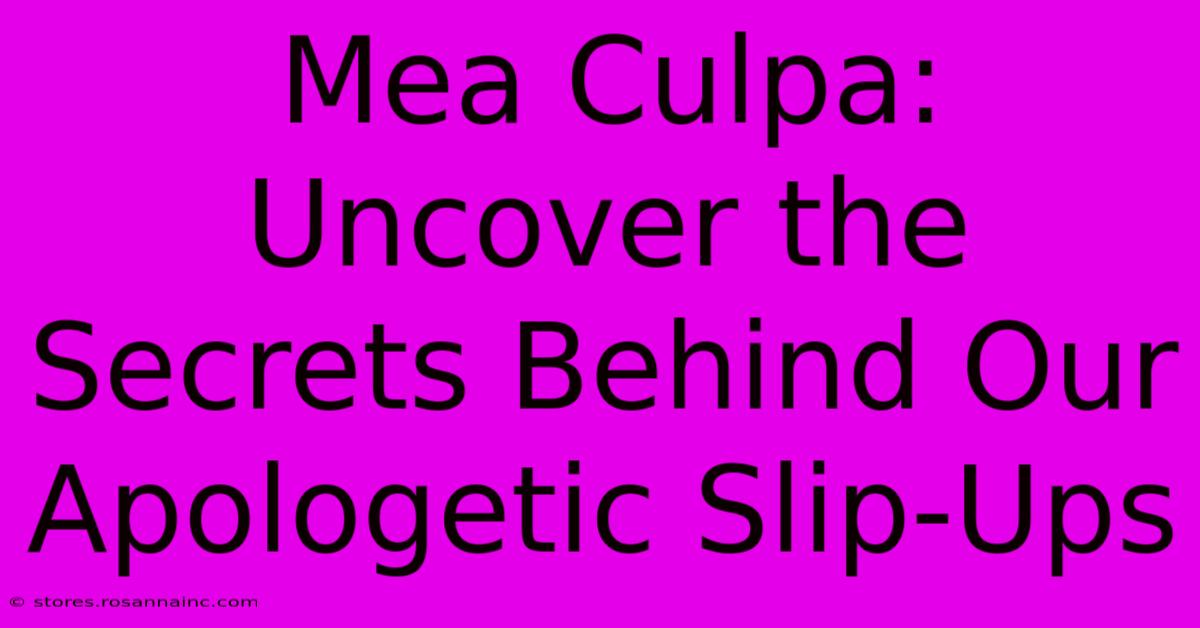Mea Culpa: Uncover The Secrets Behind Our Apologetic Slip-Ups

Table of Contents
Mea Culpa: Uncover the Secrets Behind Our Apologetic Slip-Ups
We've all been there. That sinking feeling in your stomach after a misstep, followed by the awkward attempt at an apology that somehow makes things worse. Saying "sorry" seems simple enough, but the art of a truly effective apology is surprisingly complex. This article delves into the common pitfalls we stumble into when trying to express remorse, revealing the secrets behind apologetic slip-ups and offering guidance on how to make amends effectively.
The Anatomy of a Bad Apology
A poorly delivered apology can be more damaging than the initial offense. Why? Because it often lacks key ingredients crucial for genuine reconciliation. Let's examine some frequent culprits:
1. The "Non-Apology" Apology:
This is the classic "I'm sorry if you were offended" maneuver. It shifts blame and avoids taking responsibility. A true apology acknowledges wrongdoing without excuses. Avoid phrases that minimize your actions or imply the other person is overreacting.
2. The "But" Apology:
Following your apology with a "but" completely undermines its impact. For example, "I'm sorry I yelled, but you made me angry." This immediately redirects the focus back to the other person's perceived fault, negating the sincerity of your initial remorse. Focus solely on your actions and their consequences.
3. The Passive-Aggressive Apology:
This veiled apology drips with sarcasm or resentment. It's often delivered with a tone that contradicts the words themselves. Genuine remorse should be evident in both words and tone. If you find yourself unable to express sincerity, it's better to postpone the apology until you can do so authentically.
4. The Delayed Apology:
Time can erode the impact of an apology. The longer you wait, the more the other person might feel disregarded and their hurt intensified. A timely apology shows respect and acknowledges the urgency of repairing the damage.
Mastering the Art of a Sincere Apology
So, how do you navigate these treacherous waters and deliver an apology that truly heals?
1. Own Your Mistakes:
Take full responsibility for your actions without making excuses. Use "I" statements to focus on your role in the situation. For instance, instead of saying "Things got messed up," try, "I messed up by..."
2. Express Empathy:
Acknowledge the other person's feelings and perspective. Show that you understand how your actions affected them. Phrases like, "I understand how my actions hurt you," demonstrate genuine care and concern.
3. Offer a Sincere Solution:
If possible, propose a way to rectify the situation. This shows your commitment to making amends and preventing future occurrences.
4. Listen Actively:
Give the other person space to express their feelings without interruption. Active listening demonstrates respect and allows for a more meaningful dialogue.
5. Follow Through:
A sincere apology is not a one-time event. It requires a commitment to change your behavior and avoid repeating the same mistakes.
Beyond the Words: The Importance of Body Language
Your body language plays a crucial role in conveying sincerity. Maintain eye contact, use a calm and respectful tone, and avoid defensive postures. Your nonverbal cues should reinforce the message of your apology.
Conclusion: The Power of a True Mea Culpa
A genuine apology can be a powerful tool for repairing damaged relationships. By understanding the common mistakes and following the steps outlined above, you can master the art of expressing remorse effectively and build stronger, healthier connections. Remember, a heartfelt "mea culpa" is more than just words; it's a demonstration of respect, responsibility, and a commitment to growth.

Thank you for visiting our website wich cover about Mea Culpa: Uncover The Secrets Behind Our Apologetic Slip-Ups. We hope the information provided has been useful to you. Feel free to contact us if you have any questions or need further assistance. See you next time and dont miss to bookmark.
Featured Posts
-
Supercharge Your Email List Connecting Stripe Purchases To Mailer Lite In 5 Easy Steps
Feb 04, 2025
-
Decode The Enigma Uncover Your Signatures Cursive Mystery
Feb 04, 2025
-
The Art Of Earring Alchemy Monica Vinaders Signature Designs
Feb 04, 2025
-
Say It With Orange The Ultimate Guide To Orange Rose Meanings
Feb 04, 2025
-
Flower Power On A Budget Discover The Magic Of Wholesale Prices
Feb 04, 2025
